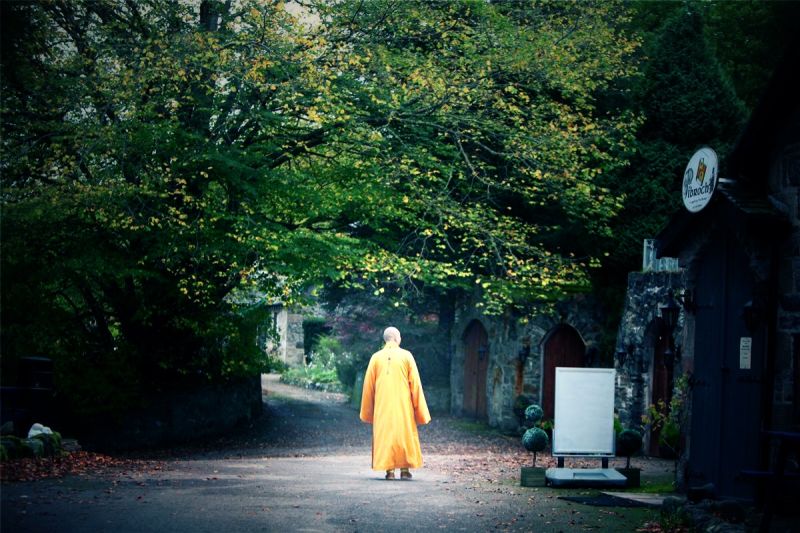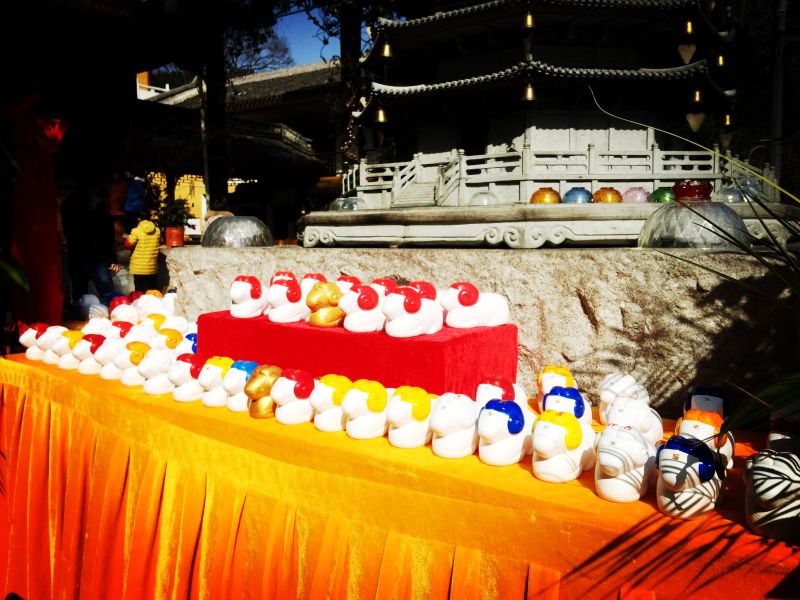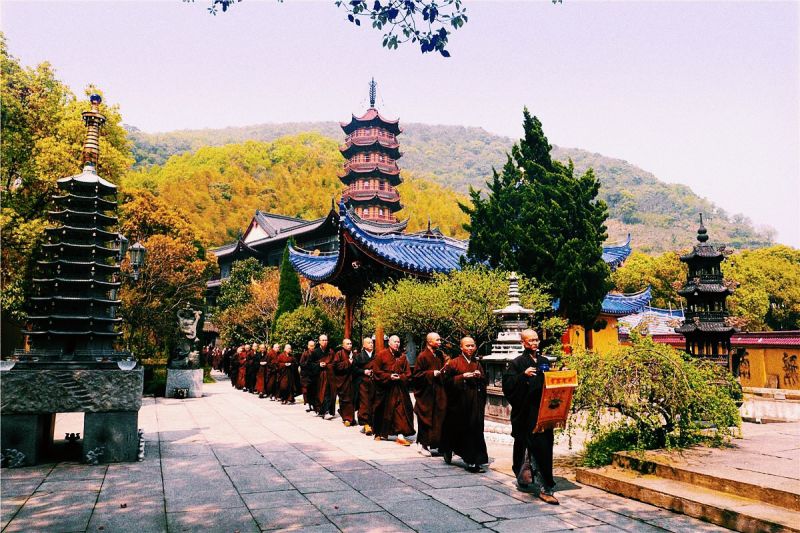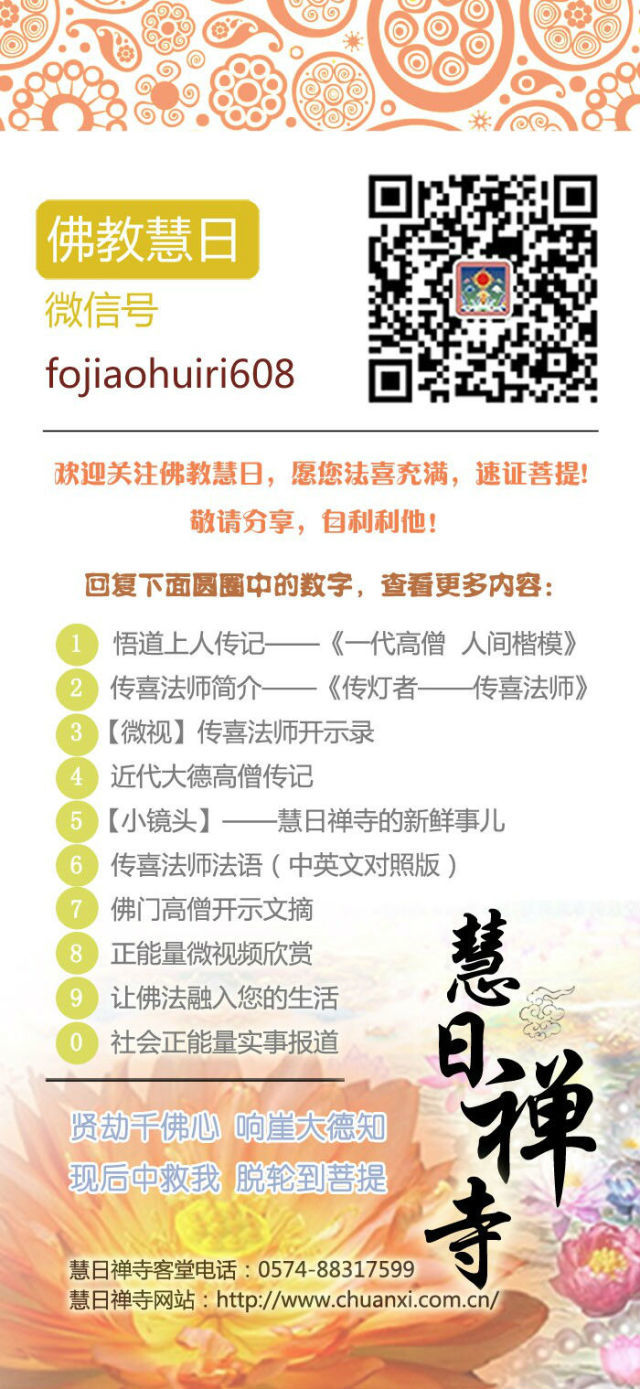达摩祖师也是观世音菩萨的化身
达摩祖师也是观世音菩萨的化身, 祂来我们震旦国传佛心印, 开创了中国的禅宗, 传完之后就在熊耳山示现入灭。 一年后, 有一个魏文帝派往西域的使臣叫宋仁, 从印度归来, 半路上遇到达摩祖师, 见祂肩扛的拐棍上还挑了一只芒鞋。 因为印度人不穿鞋子, 但在中国光着脚丫见皇帝好像不恭敬, 祂就穿了一双芒鞋, 回国时顺便带了一只 “旅游纪念品”。 宋仁跟皇帝说: 我回来时在雪峰遇到了达摩祖师。皇帝说: 不可能, 达摩祖师一年前已经圆寂了。 宋仁说: 我亲眼见到的, 我还跟祂交谈了呢。 最后皇帝派人打开坟墓, 发现尸身杳然不知去向, 唯剩一只芒鞋矣。

观世音菩萨也有现比丘尼身的, 以前的总持比丘尼, 莫山比丘尼都是证道的, 为出家的女众说法。优婆塞、 优婆夷意思是近事男、 近事女, 就是近三宝而奉如来之事的人, 他们经常亲近善知识, 经常围绕道场,也叫男居士、 女居士。 他们皈依三宝, 受持五戒, 在家行持佛法。比丘、 比丘尼受戒以后是披袈裟的, 优婆塞、 优婆夷受了五戒可以披幔衣。 居士受五戒不一定要全受, 受其中的四戒、 三戒、 两戒乃至只受一戒也可以。 受一戒就有五个护法神来护持你, 受五戒就有二十五个护法神来护持你。这次讲经希望大家都发菩提心, 愿意依教奉行, 我准备给大家授一次五戒。
有的人看到我们出家人有点害怕, 好像来听我们讲法就要出家一样, 他愿意听在家的佛弟子讲法, 好像有一种安全感。 有的优婆塞、 优婆夷本身就是做官的, 是大富翁,那些人就更喜欢听他说法。 这时候观世音菩萨就现优婆塞、 优婆夷身来给这些众生说法, 说三皈五戒, 赞叹佛法僧三宝, 以这样的身来度化他们。优婆塞、 优婆夷是依出家二众来建立的。居士一定要亲近善知识, 依教奉行, 修持正法。 如果他不去亲近善知识, 自己在家盲修瞎炼, 这是末法的衰相,大家特别要注意这一点。  Eternal (Lecture on the Guan Yin Bodhisattva Universal Door)(55)
Eternal (Lecture on the Guan Yin Bodhisattva Universal Door)(55)
By Master Chuanxi
Patriarch Bodhidharma was an embodiment of Guan Shi Yin Bodhisattva too. He travelled to China to sow the seeds of the Buddha’s teaching. The Patriarch set up the Zen School in China before he entered Nirvana in Mount Xiong’er. One year after his Nirvana, an ambassador called Song Ren, who was sent to the Western Regions by Emperor Wen of Wei Dynasty, came across Patriarch Bodhidharma on his way back from India. Patriarch Bodhidharma carried a straw sandal on a crutch over his shoulder as a souvenir from China because he had to wear a pair of straw sandals to show his respect to the emperor though in India people used to be bear-footed. When Song Ren reported to the Emperor of his meeting with Patriarch Bodhidharma on the Snow Peak, the Emperor could hardly believe, for the Patriarch had gone into Nirvana one year before. For confirmation, he ordered officers to open his tomb. Surprisingly,they didn’t find the Patriarch’s corpse but only one straw sandal.
The Bodhisattva has also appeared as nuns such as Bhikshuni Zong Chi and Mo Shan. They both had attained enlightenment and preached to other nuns.Upasaka and upasika refer to male and female disciples respectively who practice Dharma athome. They like to follow wise masters and are fond of places for practicing Dharma. They are also called household practitioners or Jushi in Chinese. Monks and nuns wear kasayas (monk or nun’s formal costume) after having accepted all commandments, whereas upasaka and upasika can dress in the layman’s robe after the acceptance of the five commandments. It is not compulsory for household disciples to take all the five commandments. They can take four, three, or even just one. For every commandment you take, you get five Dharma protectors to guard you. I hope that everyone present in this assembly will decide to follow the teachings of the Buddha to cultivate Bodhicitta. I am going to impart to you the ritual of the five commandments. Some people are afraid of learning from monks or nuns because of a misconception that the learning will be the preparation for their tonsure. They are willing to listen to the speeches of household practitioners as if they are safe from being tonsured. Some upasaka and upasika themselves are officials or very wealthy people. Accordingly, Guan Shi Yin Bodhisattva will appear as upasaka or upasika to teach them the benefits of taking refuge in the Three Jewels, praising the Three Jewels and accepting the five commandments.
Upasaka and upasika were established on the reliance of monks and nuns. Therefore,household practitioners should follow wise masters and their teachings of wise knowledge. Otherwise, their practice will be aimless and turn out to be a mistake. This kind of phenomenon is a signal of the decline period of Dharma.We should all be cautious about that.
——摘自《永恒的甘露》传喜法师开示录
爱出者爱返,福往者福来。随喜转载,功德无量。
